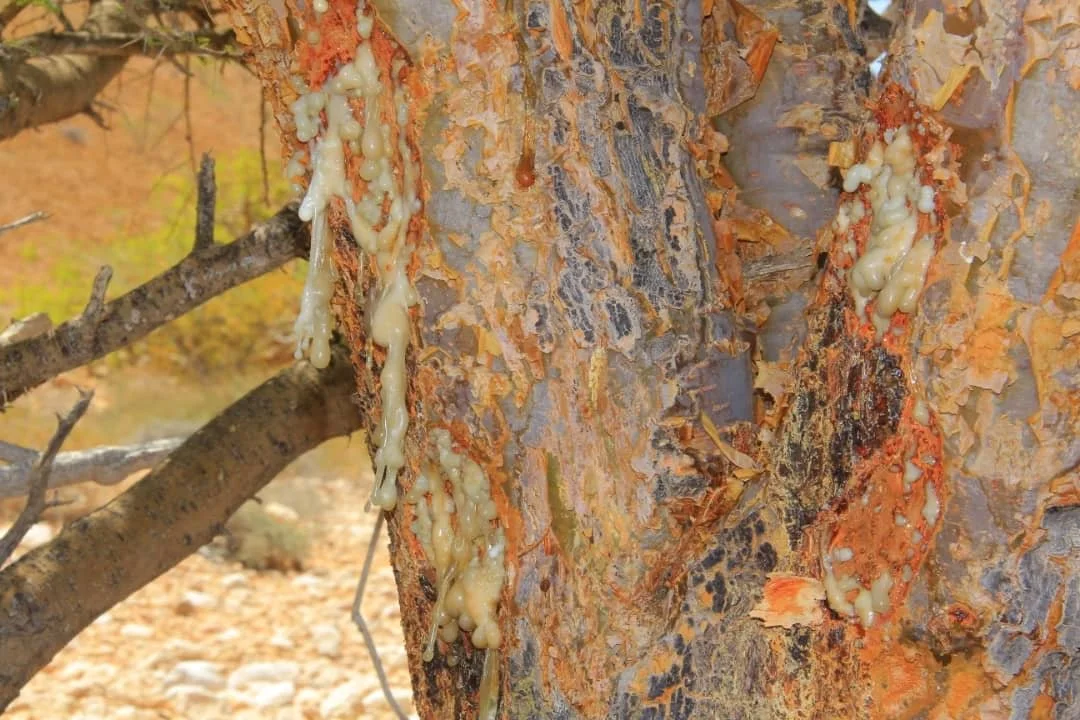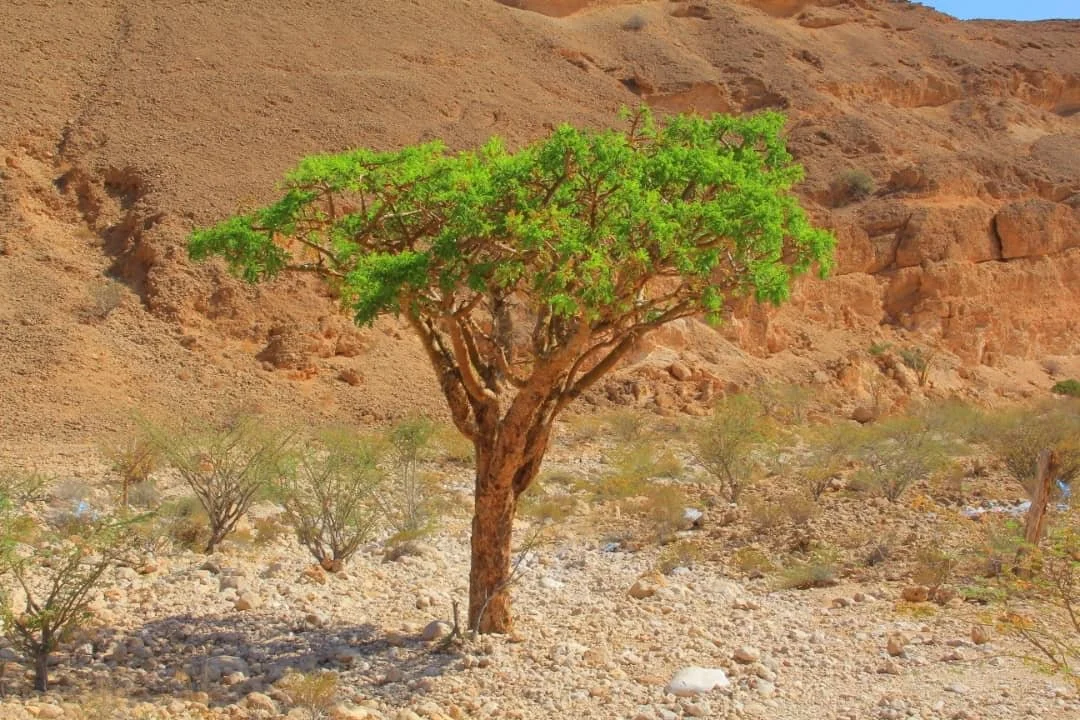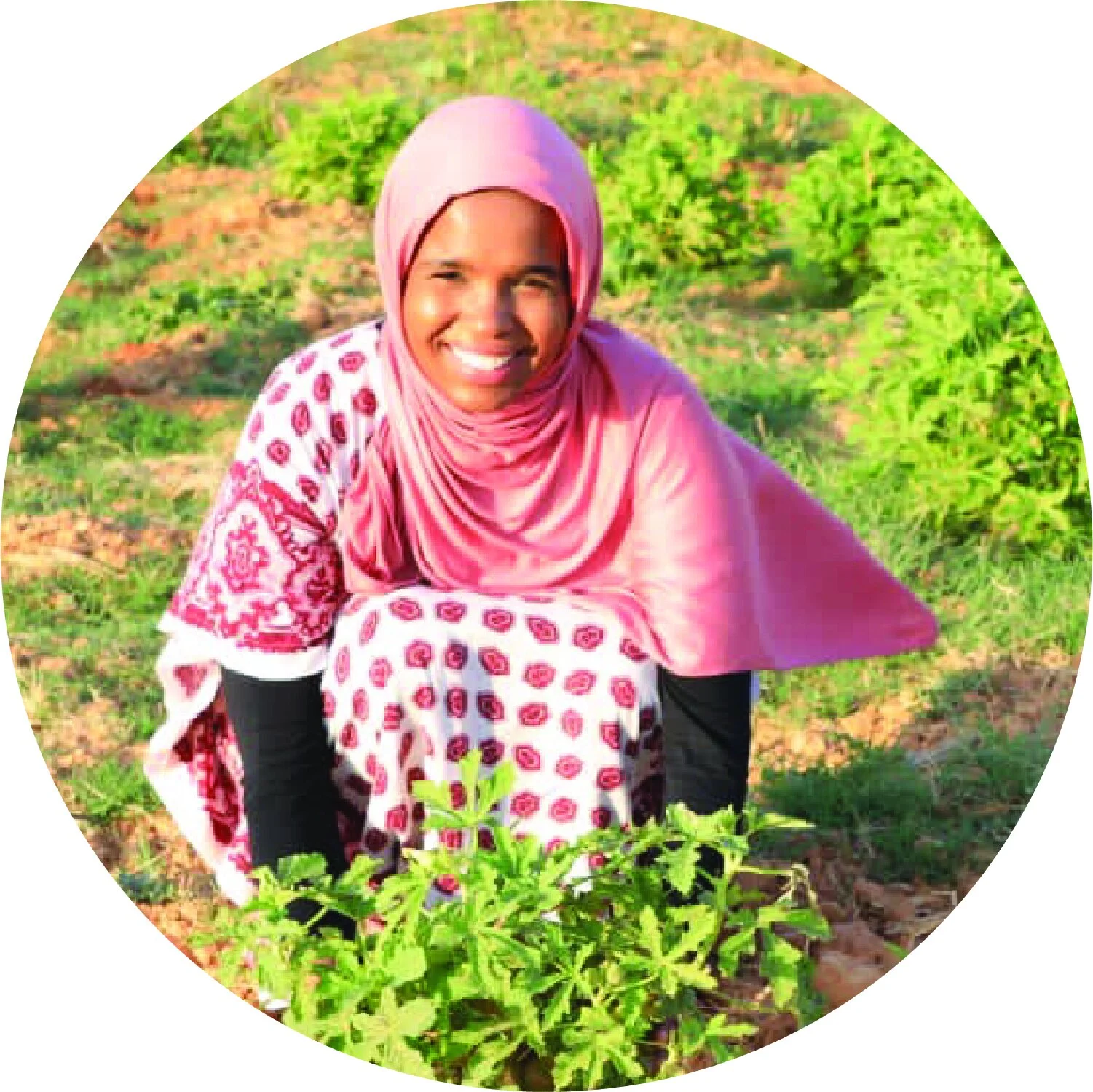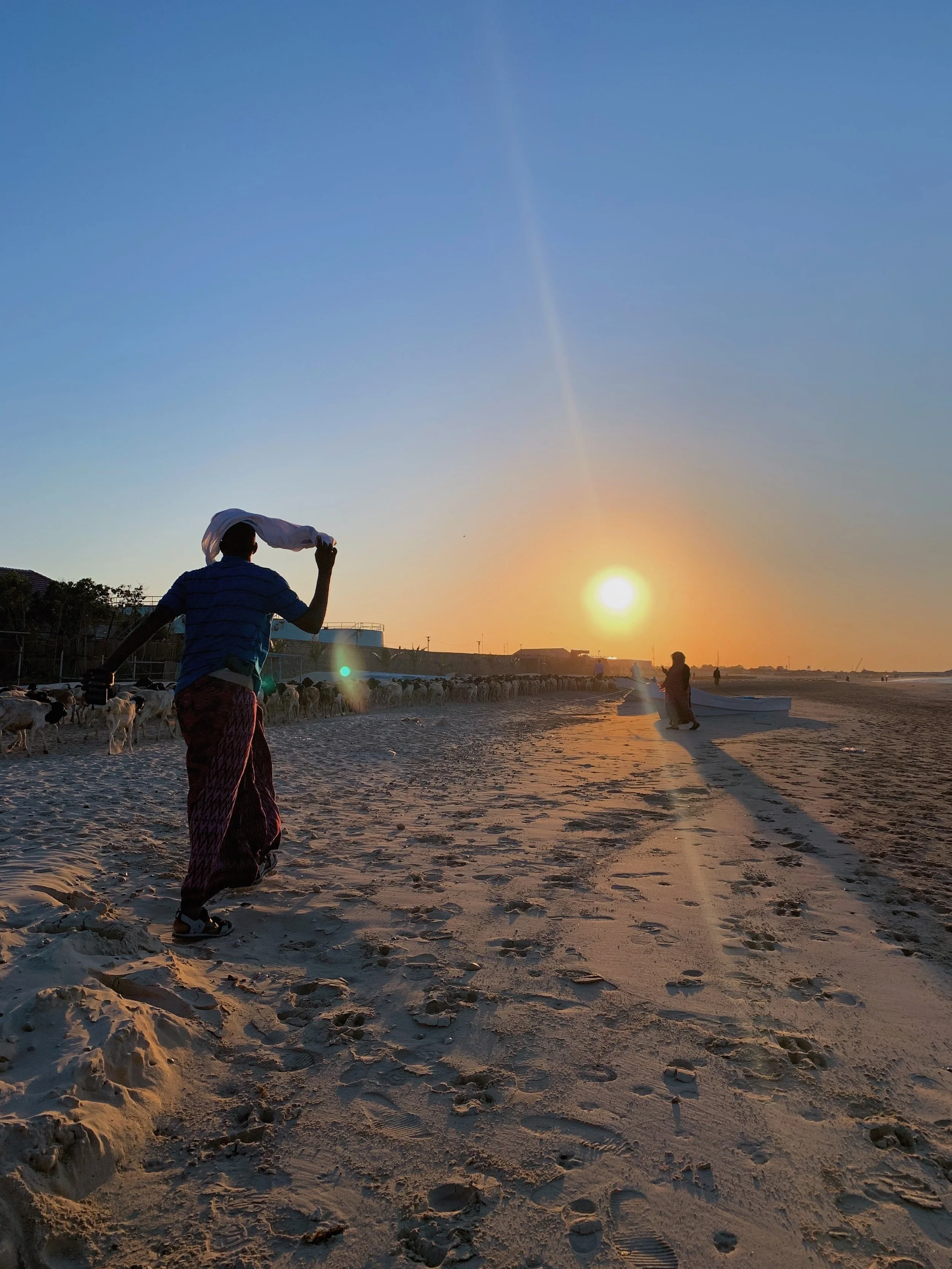Suomeksi / English
Healing (in) the Homeland
How Yasmin Mohamud returned home and, through work around permaculture ethics, together with indigenous knowledge, is rebuilding a new Somalia.
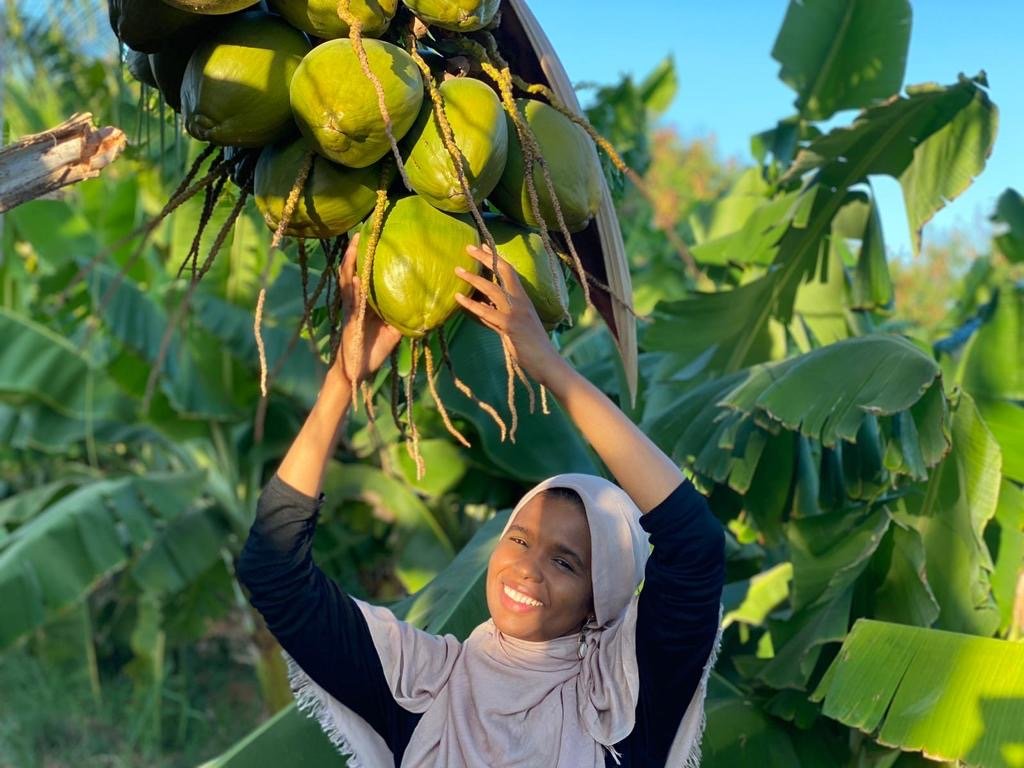
Text: Yasmin Mohamud
Photography: Yasmin Mohamud
November 25, 2021
I feel the most love and freedom in the desert. My heart fills with joy as I join in camel rides, dance, and sing, forging a deeper connection with my ancestral land. This bond drives my inward journey, the journey to heal.
My ancestors are nomads from Puntland who have an intimate relationship with the desert. Their lives are determined by the movement of the clouds, the blooming of grasses, the winds, and the rains. For them, the desert is a source of liberation from civilization's moral and physical pollution. It operates as a source of omens and understanding. They believe that God cares for them by nourishing them physically, spiritually and sustaining them in the desert.
My family fled to Kenya and then to Canada in 1992. It was our first time on an airplane and our first experience with frigid temperatures. I remember freezing as we waited at the airport to be greeted by our sponsors, who came to welcome us as "new Canadians" and hand us our winter coats.
In the late 90s, when we started school, our teachers thought our covered heads were the most unusual thing they had ever seen and white students seemed to be convinced that my choice to cover my head, somehow meant, I was neglecting my hair. Some even questioned if I had any hair underneath my hijab and whether I showered with my scarf on. At first I wasn’t sure if they were serious.
During the summer of 2014, I traveled from Toronto to Somalia, where I was shocked to see the effect of climate change on the living conditions of the local community. People in Somalia live on the front line of climate change and for them, it is not some abstract future, but reality today. They feel the effects of it in immediate and tangible ways in their day-to-day lives.
Life hinges on massive challenges like deforestation, desertification, ecological decline, food insecurity, water shortages and a collapsing fishery, particularly on the coastline. All of this poses an enormous challenge to local communities, biodiversity and the ecosystem as a whole.
“The traumatic experience of the war has left the wounds too deep to heal on their own, both in the homeland and diaspora.”
Many current agricultural practices in Somalia have caused a lot of damage to the natural ecosystems. The method of pastoralism for instance, which is predominant in the Northern parts of the country, has led to widespread problems of overgrazing. It has damaged and degraded the natural ecosystems of the region and led to widespread de-vegetation and deforestation.
This, in turn, has led to decreased rainfall and desertification. The problem has been exacerbated by the overuse of wood for fuel, in for instance, charcoal production and construction. As a result, the loss of vegetation is widespread and a significant factor in food insecurity.
After Somalia's central government collapsed in 1991, the political turmoil led people to revert to their traditional and religious law, to govern and resolve clan conflicts in the vacuum of power. In addition, exclusive politics, unemployment, and poverty have further weakened the region and continue to do so. This has made it challenging to form a cohesive response to environmental problems.
Because of the civil war, Somali communities who migrated to the West often feel they have no place to return to, or a country to call home. The traumatic experience of the war has left the wounds too deep to heal on their own, both in the homeland and diaspora.
When I came back to Canada, that same year, I felt trapped. I felt lonely, and my daily routines seemed to lose all meaning. I kept thinking to myself that there had to be a better way to live. I thought about how I could reconnect with my ancestral land, engage with my community, learn, share knowledge and take and spur action.
Four years later, after feeling out of place for my entire life, I decided to find my place in the world, return to my home and become one with the Somali nomads, to work collectively with the local community, to heal the land and the trauma of war. I took a giant leap and moved to Somalia with a duffle bag and not a single friend or family member in sight.
“Somalia is one of the wealthiest countries in the world. It is our duty and privilege to try to deconstruct the harmful narratives of Somalia. By reshaping the narrative, we can begin to change others' opinions and our own perceptions of ourselves.”
Somalis remember the good old days, when growing up in Mogadishu meant living in the best city in Africa. Before the anarchy, in the 1970s and 80s, Mogadishu was known for its nightlife, fashion, thriving arts scene, and openness to the world. Tourists from around the world came to Mogadishu to laze on the longest white sand beach in Africa. Unfortunately due to cultural forgetfulness, few outsiders know about the good old days. Forgetting the past is not as easy for those who remember it personally.
Many of the problems in Somalia have nothing to do with poverty or conflicts but rather relate to human systems. What has happened is due to the nefarious things happening behind the scenes. All the problems in Somalia are reduced now to one single issue; corruption.
What is seen by the outside world are only the tragedies and poverty in Somalia. A persistent narrative pushed upon Somalia is that it is one of the poorest countries in the world. Having spent time here, I know this to be false. In truth Somalia is one of the wealthiest countries in the world. It is our duty and privilege to try to deconstruct the harmful narratives of Somalia. By reshaping the narrative, we can begin to change others' opinions and our own perceptions of ourselves.
Somali people are amazing with beautiful social networks. They are lovely, generous people. As Africans, our cultural identity is rooted in history and long, strong cultural traditions. For me, being African is all about that shared history and cultural affinities across the continent. It is about feeling a sense of belonging to this place and compassion and understanding for its people.
Somalia is also one of the richest countries in natural resources like uranium, gold, limestone, and diamonds. It is not poor by chance, it is over-exploited.
“The legacy of colonial exploitation can still be seen across the continent and in truth colonialism is far from over.”
In the Conference of Berlin on November 15th 1884, the German Chancellor called together a meeting of 18 European leaders. At this meeting, European leaders sat around the table and plotted the formalization and colonization of the entire African continent. By 1902, 90 percent of all of Africa was under European colonial rule.
It is crucial not to white-wash and obliterate the horrors of colonialism and the long history of exploitation, disenfranchisement, dishonesty, and cruelty. During this period, African producers experienced disenfranchisement and a loss of natural and material resources, which continue to shape wealth disparities in the present day. Economies were restructured to export raw commodities like tea, coffee, and chocolate to Europe and the other 'colonies' of these European powers. The legacy of colonial exploitation can still be seen across the continent and in truth colonialism is far from over.
In Somalia, frankincense and myrrh are just two of our national goods that leave Somalia without significantly enriching our own citizens. Frankincense, a gum resin derived from a shrub of the genus Boswellia, belonging to the Burseraceae family, can be found at most cosmetics counters in the West. A large number of it is harvested in Somalia. The resin from these Boswellia trees is available in various grades, depending on the harvest time. The premium resins are from Puntland, my ancestral land. Puntland got its name from the Pharaohs of ancient Egypt, who referred to it as the "Holy Land of Punt" due to its richness in resources.
“There is a local saying that any job is better than becoming a frankincense collector and most pastoralists despise collecting gum resins, because it is dangerous and does not pay enough to cover basic needs.”
In Somalia, I started to work for organizations dedicated to restoring land. Through my work with the nomadic community, I learned that those who harvest frankincense are usually impoverished nomadic pastoralists or small-scale fishermen. There is a local saying that any job is better than becoming a frankincense collector and most pastoralists despise collecting gum resins, because it is dangerous and does not pay enough to cover basic needs.
The Boswellia carterii is also a species directly impacted by climate change. Due to land degradation and global warming, it is now endangered. Without environmental intervention the species could be gone in 50 years. Sustainable land management and sustainable communities that work with nature are essential to saving it.
After the civil war, Somali national parks were destroyed and much of the land still remains uninhabitable for local wildlife. As Somalia is in a state of recovery, the rewilding of the animals needs to be done as soon as possible. Everything works in relation to each other: the loss of habitat determines the number of wild animals, so restoring the habitat is to restore the animals.
Somalia is rich in natural, renewable resources, which could be harnessed to heal the land and improve people's lives. Native plant life can be harnessed to provide ecosystem services in its own right, bring rain when planted on watersheds, and serve as pioneer plants for a range of other food and resource-producing plants to thrive.
“In places where indigenous people are not suppressed, one finds beautiful forests, grasslands, waters, falls, and wildlife.”
One of the most inspiring things that I have found in my journey is that landscapes reflect human consciousness. In places where indigenous people are not suppressed, one finds beautiful forests, grasslands, waters, falls, and wildlife.
Nowadays, I work in unison with the community, to develop sustainable harvesting practices and ethical business in the region, to allow sustainable frankincense production to thrive. Our project revolves around permaculture, a blueprint for sustainable living and sustainable food production. Permaculture ethics are essential, with three core ethics; care for our planet, care for people, and fair share (or return of surplus to the system). By sticking to these core ethics, we work to create thriving ecosystems and communities that are self-sustaining for generations to come.
We aim to show that sustainable change is possible across this bioregion, by rolling out ecosystem restoration camps across Somalia. Through this restoration the people work towards combating poverty, famine, climate change, loss of freshwater, desertification, and biodiversity loss. Their work brings degraded areas back to life and enables their own communities to benefit from a regenerative landscape. This is a practice that could work outside of Somalia as well, benefiting the global community on a pathway to a more sustainable future.
Currently, we are working on a camp that will support trainers and students who can take practical measures to restore and enhance Somalia's precious natural resources. They will work to build resilient water systems, feed the soil, provide for the people, and make large nursery systems to re-green the deserts and rebuild Somalia's natural and cultural capital for a better future.
“Through my work around permaculture ethics, principles, and practices together with indigenous knowledge and culture, I can communicate and collaborate and be a genuine part of community rebuilding.”
As of now, I am excited to start building an Ecosystem Restoration Camp in Puntland’s capital, Garowe. Using small and slow solutions, I am working from my base in Puntland, to establish a team of trainers who can work with the local community to solve the problems they face. The Puntland state government and our organization have formed a partnership to create a small-scale ecosystem restoration test site that will be used as a public park. This is a fascinating time for us, as this park will have one of the nation's first dedicated cycle and walking paths.
I now understand that recovery in Somalia, and survival in the face of our warming planet, depends on building natural and cultural capital, restoring degraded landscapes, equality, and establishing strong, community-led economic resurgence. Through my work, I have begun to see that I could have a role to play in generating this necessary change – quite literally from the ground up.
In Somalia, I found my place and learned life beyond a mundane existence. Even though it brings me inner peace and happiness, being able to live a more simple life, what I discovered in Somalia was far more than just a personal sense of purpose and fulfillment. Through my work around permaculture ethics, principles, and practices together with indigenous knowledge and culture, I can communicate and collaborate and be a genuine part of community rebuilding. I can serve, not just consume. Here, I am free of the excess consumerism and frenetic jumble of values that plagues the West. Here, I have the opportunity to grow and be a part of a new Somalia that we are building together.
There is an immense opportunity here for many people, willing to work hard and be part of something new. For me, healing of the land and the purification of the human spirit is the same process.
Yasmin Mohamud is a director at Dry-land Solutions, a coordinator at Ecosystem Restoration Camps and a current RRU Environmental Science Major. Mohamud has a background in Civil Technology and is specialized in Municipal Engineering. She is most passionate about community building and creating resilient communities.
Further information
The first Permaculture Design Course
The first Permaculture Design Course (PDC) took place in Garowe, Somalia, in October 2021 under instruction from permaculture expert Antoine Bernadeau, co-founder of Inaya Permaculture. The successful candidates received full training and certification in ecosystem restoration and Permaculture Design Course (PDC).
Dryland Solutions
Dryland Solutions was established in 2019 to support the work of Ecosystem Restoration in Somalia. Dryland Solutions strives to improve the lives of rural communities (including women, IDPs, and minorities) by tackling poverty and environmental damage through the creation of ecosystem restoration camps. Our team aims to help them create a sustainable future through indigenous knowledge and cutting-edge ecological designs by empowering local and rural communities through training, knowledge, and green solutions. By restoring ecosystems, we can fight back against climate change, inequality, and conflict. Dryland Solutions is part of the Ecosystem Restoration Camps (ERC) Network.
Ecosystem Restoration Camps (ERC)
ERC was established in 2017 to support the work of Ecosystem Restoration Camps around the world. ERC is supported by an advisory council made up of the world's leading experts and practitioners in the field of Ecosystem Restoration and a team of professionals managing the organization, providing services to camps, communications, and coordination. The work of Camp Dryland Solutions is directly supported by the knowledge, skills, and managerial capacities of ERC.
Beyond Conservation
Beyond Conservation is a small non-profit, non-governmental organisation. We work with local communities in the region, and international partners, to build public awareness of the importance of preserving both land-based and marine environments, wildlife, and habitats. Beyond Conservation primarily focuses on educating those sectors of the society that are generally left behind (women, youth, minorities, etc.)
Read More
Shukri Carabey traveled back to Somalia to reconnect with her biological father but found something much more profound: a connection with herself and new families in friends and love.
By Nathanya Lennvall
Mistä ihminen voi tietää olevansa kotoisin toisesta kotimaastaan? Mistä jostain kotoisin oleminen alkaa ja mihin se päättyy? Ruskeat Tytöt ry:n perustajajäsen Ervin Latimer esittelee erilaisia teorioita.

